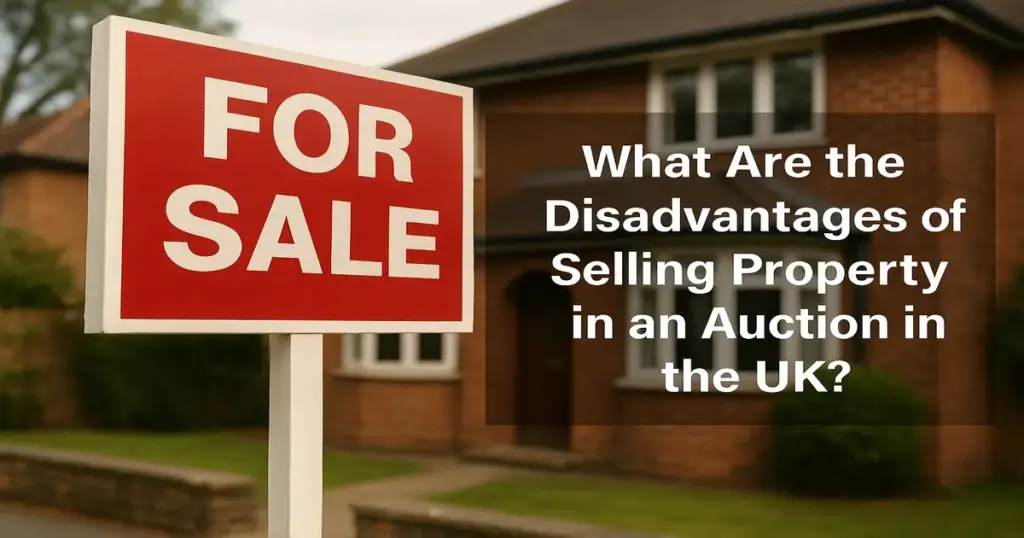What are the disadvantages of selling property at an auction in the UK?
Selling property at auction in the UK has become a more visible and increasingly popular method for homeowners, investors, and developers. The allure of a quick sale, competitive bidding, and transaction certainty often tempts sellers to choose the auction route.
However, while the benefits are frequently touted, the potential drawbacks are not always apparent. This article delves deeply into the disadvantages of selling property through auction in the UK, exploring both the practical and strategic pitfalls that sellers may encounter.
Lack of Control Over Final Sale Price
One of the most significant risks in selling at auction is the lack of control over the final sale price. Unlike private treaty sales, where negotiations can help shape the outcome, auctions rely on competitive bidding. If interest is low or only a few bidders attend, the property might sell for less than its actual market value. Once the hammer falls, the sale is legally binding, and the seller must accept the price, regardless of whether it meets expectations.
Non-Refundable Marketing and Auction Fees
Auction houses charge upfront marketing fees, which can be substantial. These costs typically include advertising, catalogue listings, and promotional activities to attract bidders. Additionally, sellers may be required to pay a portion of the auctioneer’s fee, even if the property doesn’t sell, which means sellers could be out of pocket with no sale.
Pressure to Set a Low Guide Price
Auction houses often recommend a low guide price to generate interest and bidding competition. While this strategy can attract a wider audience, it has its dangers. If the bidding does not escalate beyond the reserve price (the minimum the seller will accept), the property might not sell. Still, sellers risk underselling their asset if they feel pressured to set a low reserve to ensure a sale.
Limited Buyer Pool
While auctions can attract serious investors and cash buyers, they may exclude traditional homebuyers who rely on mortgages. This is because auction purchases typically require completion within 28 days, which may be too tight for mortgage approvals and surveys. Consequently, the pool of potential buyers is smaller and more niche, reducing the chances of achieving a high price.
Lack of Flexibility in Negotiations
Auctions are not conducive to negotiation. Once the bidding begins, there is no room to adjust terms, respond to buyer concerns, or make deals based on contingencies. This rigidity can deter some buyers and leave sellers unable to adapt to last-minute developments that might have salvaged or enhanced a sale in a private treaty scenario.
Costs of Legal Preparation
Before going to auction, sellers must prepare a legal pack for potential buyers. This includes title deeds, searches, planning permissions, leasehold documents, and other due diligence materials. Preparing this legal pack incurs costs, which are typically non-refundable and must be paid upfront, regardless of whether the property sells.
Time and Energy in Preparation
Selling at auction is not necessarily a “hands-off” process.” Sellers must prepare their property, liaise with solicitors, coordinate with auctioneers, and respond to enquiries during the marketing phase. This can require significant time and energy, especially for sellers unfamiliar with the auction process.
Public Sale Process
An auction is a public event. All bidding, sale prices, and property information are openly disclosed, which may not suit sellers who prefer discretion.
If a property fails to sell, it becomes a matter of public record, potentially harming its market perception in future attempts to sell.
Stigma of Desperation
In some circles, selling at auction carries a stigma. It can be perceived as a last resort for distressed properties or sellers in financial trouble. While this is not always the case, the perception may deter some potential buyers or reduce their willingness to pay full market value.
Risk of Unsold Property
There is no guarantee that a property will sell at auction. Suppose bidding fails to meet the reserve price. In that case, the property is unsold, and the seller must decide whether to enter relist-or-auction negotiations, relist the property, or pursue alternative sales methods.
Each option involves additional time, uncertainty, and possibly further costs.
Quick Turnaround May Not Suit All Sellers
Once the hammer falls, contracts are exchanged immediately, and completion usually occurs within 28 days. While this swift timeline is attractive to some, it may pose challenges to others. Sellers may not be ready to vacate or might not have arranged alternative accommodation. In such cases, the speed of the auction process becomes a liability rather than an asset.
Complications with Tenanted Properties
Selling a tenanted property at auction can introduce complications. Buyers may be wary of existing tenants, lease agreements, or potential issues with possession. Unless clearly explained and legally addressed in the auction pack, they could deter bidding or lower the final sale price.
Reputational Risk for Developers or Landlords
Property developers or landlords who regularly sell assets may risk their professional reputation if they repeatedly use auctions and their properties consistently underperform. Low prices achieved at auction could affect perceptions of quality or value, impacting future transactions.
No Option to “Test the market”
In private treaty sales, sellers often have the flexibility to test the market at one price and reduce it if necessary. Auctions require commitment to a set guide and reserve price from the outset. If the pricing strategy is off-target, there’s little time to adjust once the catalogue is published and marketing begins.
Not Suitable for All Property Types
Some properties aren’t warranted for auction. For example, premium homes, unique character properties, or those with highly subjective value might fare better through private sale, where emotional appeal and buyer-seller negotiation can play a larger role. Auction properties with investment potential, redevelopment opportunities, or bargain appeal.
FAQs: Selling Property at Auction in the UK
Q1: Is selling a house at auction cheaper than using an estate agent?
Not necessarily. While estate agent commissions can be avoided or minimised, auction houses charge fees, including entry costs, catalogue listings, and legal pack preparation. These expenses can equal or exceed traditional selling costs.
Q2: Can I change my mind after the auction has started?
No. Once the bidding begins, you cannot withdraw the property without potentially incurring penalties. If the property is sold and the hammer falls, the contract is legally binding, and completion must proceed.
Q3: What happens if the property doesn’t seduce?
If bidding doesn’t reach the reserve price, the property is not sold. Sellers can negotiate with interested parties post-auction, relist it in another auction, or relist through a method. However, all auction-related fees are still payable.
Q4: Can I set a high reserve price to protect myself?
You can set a reserve price, but auction houses often discourage setting it too high as it might deter bidding. A high reserve reduces the chance of a sale, and auctioneers may advise against it to maintain high clearance rates.
Q5: Are auctions only for distressed or repossessed properties?
No, auctions are used for a wide variety of property types. However, the perception still exists that auctions are associated with urgency or distress, which can affect buyer behaviour and final sale price.
Q6: Do I need a solicitor to sell at auction?
Yes. A solicitor is needed to prepare the legal pack and manage the sale’s legal aspects. Choosing an experienced auction solicitor can help avoid costly oversights and ensure a smoother process.
Q7: How quickly will I get paid after an auction sale?
After the auction, the buyer typically pays a 10% deposit immediately, and completion is usually required within 28 days. Upon completion, you receive the remaining 90% of the sale price.
Q8: Can a buyer pull out after winning at auction?
Only under exceptional circumstances. Once the hammer falls, the buyer is legally committed. If they withdraw, they forfeit their deposit and may be liable for further costs or damages.
Q9: Are there any hidden costs I should be aware of?
Potentially, sellers must budget for legal fees, auction entry costs, marketing fees, and commission. If the property doesn’t, these costs still apply. It’s essential to understand the whole fee structure before committing.
Q10: How do I know if an auction is right for my property?
It depends on your property type, timeline, and financial goals. An auction may be ideal for properties needing renovation, with legal issues, or those attracting investors. However, a private sale might be more effective for higher-value homes or unique properties.
Final Thoughts
Selling property at auction in the UK can be a powerful tool when used correctly, offering speed, certainty, and exposure. However, it’s not without its pitfalls. The disadvantages are numerous and worth serious consideration, from unpredictable sale prices and high upfront costs to a limited buyer pool and reputational risks.
Before choosing to auction your property, consult with property professionals, weigh the pros and cons, and consider whether your goals align with the nature of the auction process. What might work brilliantly for one seller may prove disastrous for another.
Understanding the disadvantages helps avoid regret and ensures you enter the auction process with clear eyes and realistic expectations.
Useful External Links
Michael Anthony Estate Agents – Pros and Cons of Selling at Auction
https://www.michaelanthony.co.uk/news/selling-at-auction-the-pros-and-cons/Hammered Auctions – Pros and Cons of Selling a House by Auction
https://www.hammeredauctions.co.uk/selling-at-auction/pros-and-cons/HomeSellingExpert – Modern Method of Auction: Full Guide
https://www.homesellingexpert.co.uk/modern-method-of-auction/Read our top Blogs:
Sell My Property Fast For Cash In Wandsworth
What to Do If Your House Won’t Sell: Fast Solutions That Work
How to Sell a House Fast: Proven Tips to Get a Quick Sale Without Estate Agents
Call +447702210159 our friendly team for a same-day offer





